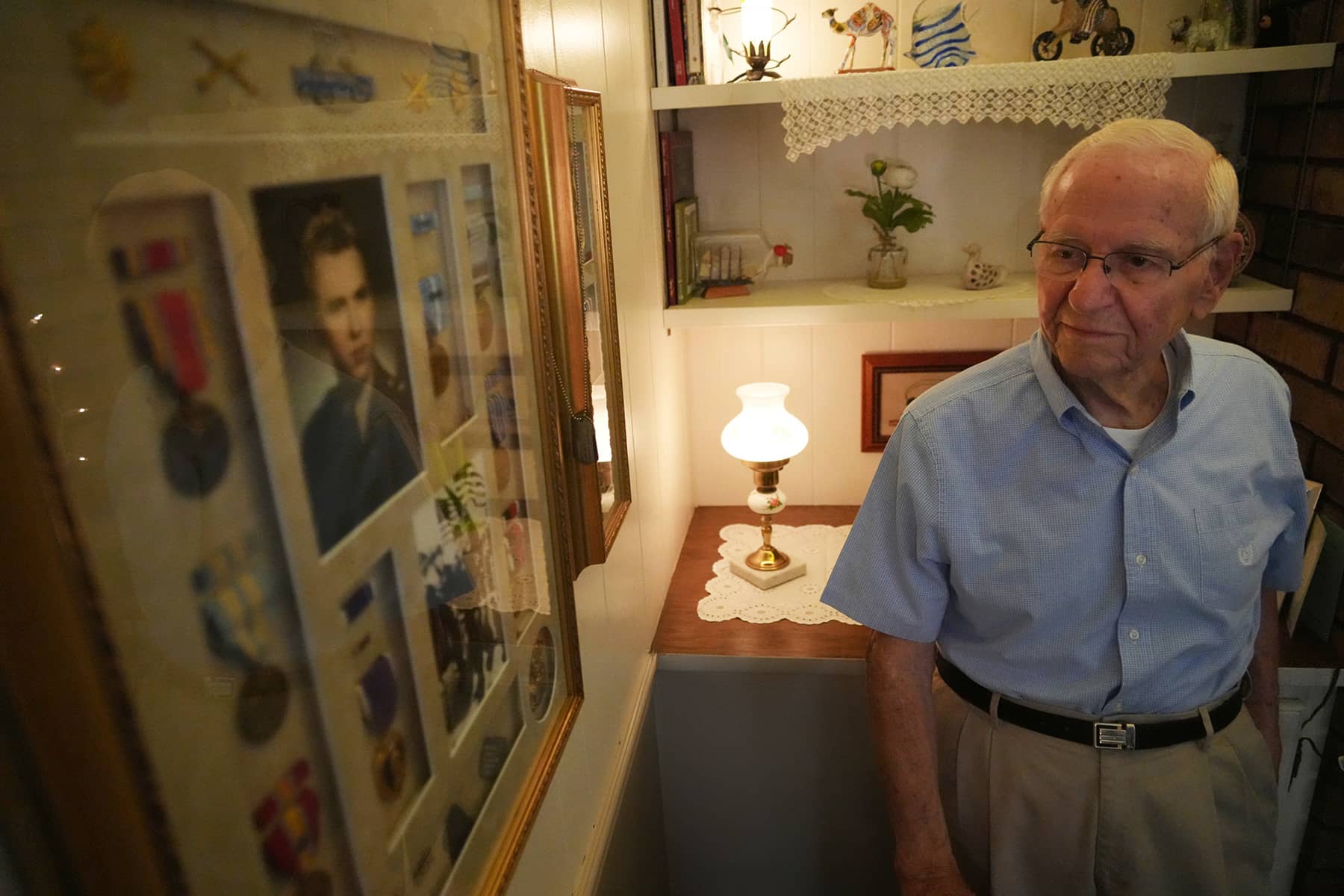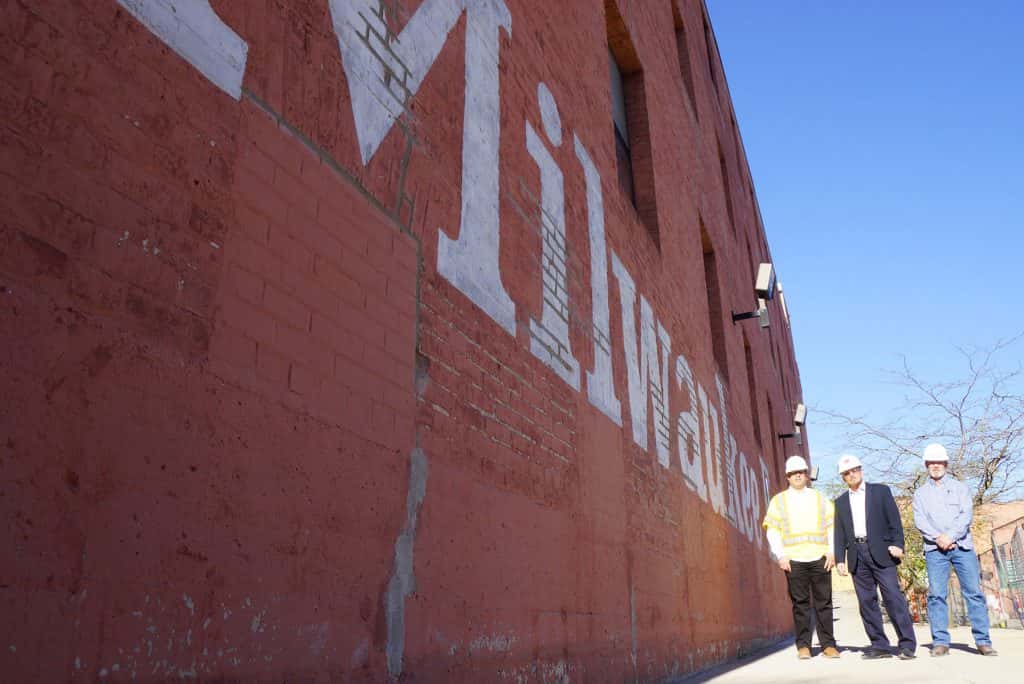
School books often focus on broad events and significant figures, presenting a general narrative that overlooks individual voices. That is why intimate accounts like Glenn Dohrmann’s are so valuable. He was a witness to parts of history that never made the printed page.
Milwaukee Independent sat down with Dohrmann in his quiet home north of Milwaukee in Cedarburg to record stories about his service in Korea, and document a personal journey marked by hardship and heroism. Born in 1926, the 98-year-old veteran had already seen a lifetime of tragedies before turning 12.
At the age of almost two, his mother passed away during childbirth, leaving his father to care for five children. The strain proved too much and within 15 months Dohrmann’s father suffered a nervous breakdown. His siblings were split up and sent off to live with relatives. A young Dohrmann found himself with an aunt and uncle on their farm.
“I was only three years old then, and my aunt and uncle already had five kids of their own. But I stayed with them until I was 12 years old,” said Dohrmann. “I learned the value of hard work from a young age. So by the time I was 13, I was able to go off on my own and support myself. I was in demand to work for other farmers because I was raised on a farm.”
Dohrmann later excelled in high school sports, and balanced learning at school with long hours of agricultural labor. While he got by with his studies, basketball became an outlet of joy for him amid the struggles of his youth.
His coach recognized his talent and encouraged him to keep playing, even paying him to stay involved in the sport so he did not need so many part-time jobs.
“One year there was a farmer who was in really bad shape,” said Dohrmann. “I had to do all his hard physical work, and all while I’m still attending my classes.”
Growing up amid the Great Depression, Dohrmann saw the long shadow it cast over the day-to-day lives of people in his community. But he personally remained mostly unaffected by it. He always had work to provide income, and the remainder of his attention was dedicated to sports or study. He had little time for anything else, so felt content and comfortable in the structured environments he was immersed.
That isolation would be a core part of his life, allowing him a refuge from the troubled world he was surrounded by. It also provided Dohrmann a lot of contentment, as he was shielded from many situations that should have provided only hardship.
“When Pearl Harbor happened in 1941, I heard about it like everyone did. When local soldiers came home on leave, the school had them talk to us. The soldiers would be there on stage with the whole assembly,” said Dohrmann. “We didn’t have to be too smart to know what was going on. So that was a pure introduction to what war was.”
Dohrmann was still in high school in those days, and too young to enlist. So he retreated into farm work and basketball. For the early years of World War II, the conflict was very distant and rarely touched his life.
“Being an orphan, my life was entirely different from other kids. I never had the chance to go to the movies until I got older in high school. My experience was that way about a lot of things because I was out of the mainstream,” said Dohrmann. “So I never got to see newsreels about the world and the war, but I knew what was going on.”
Dohrmann said the main reason he stayed working on farms for so long was because farmers could not find help. Men were off fighting the war, and most boys did not have the skills to manage farming. So he was paid very well at the time because other farmers were trying to hire him.
But as his 18th birthday approached in 1944, Dohrmann was motivated by a sense of duty and the desire for a better life. He volunteered for military service, and quickly found himself far removed from the farm experience he had known.
“I went right into basic training at Fort Bliss, Texas. From there I attended Officer Candidate Training. I had 17 months of that at Fort Benning, Georgia,” said Dohrmann. “I came out of OCS as a Second Lieutenant, but by then World War II was pretty well over. I graduated on October 31 and by January 15, 1946, I was in a newly divided Korea.”
By the time Dohrmann arrived in South Korea in early 1946, people were still reeling from years of Japanese Colonialism. As part of the U.S. occupation force, he witnessed the stark realities of a nation recovering from decades of foreign subjugation. Dohrmann’s role in the U.S. Army included interacting with local civilians and managing logistics. The insight he gained deepened his understanding of the complexities that the Korean people were experiencing.
“The Japanese Empire had ruled Korea for close to four decades. Their country was left broken, and not what it had been,” said Dohrmann. “The people seemed sad, like they were just going through the motions of life. When shopping at a grocery store, the clerks didn’t smile. The shoppers didn’t smile. It felt bleak as people just did their thing. So I realized right away what the situation was like for them.”
Dohrmann found himself stationed rather far from the capital of Seoul, in the eastern coastal town of Goseong (고성) about about 10 miles south of the 38th Parallel, which had split Korea in half. He was there for almost two years, in a remote area that had a familiar feeling of isolation.
“I had volunteered, but at that time the war was winding down. And when that happened, they didn’t pay too much attention to me,” said Dohrmann. “I just sat there and did my job. It was not hard, but not as fulfilling as I would have liked. At least it was a beautiful area, and I enjoyed the beaches as often as I could.”
At 22 years old, Dohrmann was sent back to the United States in 1948 and stationed at Fort Ord, California as an instructor. Tensions in Korea escalated over another two years and Dohrmann’s peacetime service quickly transitioned into a more active role. When North Korea invaded the South in 1950, he was deployed back to Korea.
Now a First Lieutenant, Dohrmann soon found himself in the thick of combat by January 1951. He remembered the chaos and confusion that marked the early days of the conflict, and thought that the only way he would be able to leave the country again was if he got shot.
“One of the most harrowing aspects of my experience was the relentless nature of the combat,” said Dohrmann. “What stands out the most in my memory was just the fact that you knew there was no way out. When the Chinese came in, we were constantly on the move. It seemed like we fought every day, and we knew there was no end until either we died or somehow got transferred back home.”
The psychological impact of war cannot be completely understood by anyone who has not experienced it. Dohrmann’s calm demeanor and unwavering faith were critical in managing his stress of combat. The constant threat of death, the loss of comrades, and the brutality of hand-to-hand combat left scars that extended beyond physical wounds.
For many soldiers, faith and a strong sense of duty provided a lifeline through the fog of war. For Dohrmann, his faith was the cornerstone of his resilience.
“What did faith mean to me? It meant I could speak to God at any time, whatever the condition. I absolutely put all my trust in the Lord,” said Dohrmann. “I do not talk much about my beliefs, but they connect every aspect of my life. And people seem to know that, even though I never share my faith openly. I don’t swear, I don’t use bad words, which can really stand out. I think people see me by the example that I set.”
After being wounded three times during the Battle for Hill 266, a position also referred to as “Old Baldy,” he was awarded the Silver Star and a Purple Heart. But along with the honors for his valor came the end of the Korean War for Dohrmann. He spent months healing, but the return home presented him with a new set of challenges.
The switch from an active soldier to a civilian was a complex and often difficult process. However, the strong work ethic which was ingrained during his youth on the farm, helped him navigate the difficult transition.
Dohrmann remained active in the U.S. Army Reserve. He ultimately retired after 24 years of service as a Major. The skills and discipline acquired during his military service were instrumental in his building a successful post-war life.
In 2015, Dohrmann participated in a Stars and Stripes Honor Flight, a long-running series of trips and events designed to celebrate veterans by taking them to military memorial sites in Washington DC at no charge. He also helped host a book club event for Honor Flight for the book Devotion: An Epic Story of Heroism, Friendship, and Sacrifice.
Dohrmann did not participate in the Battle of Chosin Reservoir but was deeply moved by the actions of aviators like Lt. Tom Hudner and Ensign Jesse Brown. His own experiences in the Korean War also provided a powerful perspective during the discussion.
The book event aimed to increase public awareness of “The Forgotten War,” and honor the contributions of Korean War veterans who were overshadowed by other conflicts.
“My life has been a journey of overcoming challenges and staying true to my values. I have always been a man of faith, and that has guided me through the toughest times,” Dohrmann added. “The Korean War was a significant part of my life, and I hope people remember the sacrifices made by veterans like me. I’ve always believed in setting a good example and living a life of integrity.”
- Exploring Korea: Stories from Milwaukee to the DMZ and across a divided peninsula
- A pawn of history: How the Great Power struggle to control Korea set the stage for its civil war
- Names for Korea: The evolution of English words used for its identity from Gojoseon to Daehan Minguk
- SeonJoo So Oh: Living her dream of creating a "folded paper" bridge between Milwaukee and Korean culture
- A Cultural Bridge: Why Milwaukee needs to invest in a Museum that celebrates Korean art and history
- Korean diplomat joins Milwaukee's Korean American community in celebration of 79th Liberation Day
- John T. Chisholm: Standing guard along the volatile Korean DMZ at the end of the Cold War
- Most Dangerous Game: The golf course where U.S. soldiers play surrounded by North Korean snipers
- Triumph and Tragedy: How the 1988 Seoul Olympics became a battleground for Cold War politics
- Dan Odya: The challenges of serving at the Korean Demilitarized Zone during the Vietnam War
- The Korean Demilitarized Zone: A border between peace and war that also cuts across hearts and history
- The Korean DMZ Conflict: A forgotten "Second Chapter" of America's "Forgotten War"
- Dick Cavalco: A life shaped by service but also silence for 65 years about the Korean War
- Overshadowed by conflict: Why the Korean War still struggles for recognition and remembrance
- Wisconsin's Korean War Memorial stands as a timeless tribute to a generation of "forgotten" veterans
- Glenn Dohrmann: The extraordinary journey from an orphaned farm boy to a highly decorated hero
- The fight for Hill 266: Glenn Dohrmann recalls one of the Korean War's most fierce battles
- Frozen in time: Rare photos from a side of the Korean War that most families in Milwaukee never saw
- Jessica Boling: The emotional journey from an American adoption to reclaiming her Korean identity
- A deportation story: When South Korea was forced to confront its adoption industry's history of abuse
- South Korea faces severe population decline amid growing burdens on marriage and parenthood
- Emma Daisy Gertel: Why finding comfort with the "in-between space" as a Korean adoptee is a superpower
- The Soul of Seoul: A photographic look at the dynamic streets and urban layers of a megacity
- The Creation of Hangul: A linguistic masterpiece designed by King Sejong to increase Korean literacy
- Rick Wood: Veteran Milwaukee photojournalist reflects on his rare trip to reclusive North Korea
- Dynastic Rule: Personality cult of Kim Jong Un expands as North Koreans wear his pins to show total loyalty
- South Korea formalizes nuclear deterrent strategy with U.S. as North Korea aims to boost atomic arsenal
- Tea with Jin: A rare conversation with a North Korean defector living a happier life in Seoul
- Journalism and Statecraft: Why it is complicated for foreign press to interview a North Korean defector
- Inside North Korea’s Isolation: A decade of images show rare views of life around Pyongyang
- Karyn Althoff Roelke: How Honor Flights remind Korean War veterans that they are not forgotten
- Letters from North Korea: How Milwaukee County Historical Society preserves stories from war veterans
- A Cold War Secret: Graves discovered of Russian pilots who flew MiG jets for North Korea during Korean War
- Heechang Kang: How a Korean American pastor balances tradition and integration at church
- Faith and Heritage: A Pew Research Center's perspective on Korean American Christians in Milwaukee
- Landmark legal verdict by South Korea's top court opens the door to some rights for same-sex couples
- Kenny Yoo: How the adversities of dyslexia and the war in Afghanistan fueled his success as a photojournalist
- Walking between two worlds: The complex dynamics of code-switching among Korean Americans
- A look back at Kamala Harris in South Korea as U.S. looks ahead to more provocations by North Korea
- Jason S. Yi: Feeling at peace with the duality of being both an American and a Korean in Milwaukee
- The Zainichi experience: Second season of “Pachinko” examines the hardships of ethnic Koreans in Japan
- Shadows of History: South Korea's lingering struggle for justice over "Comfort Women"
- Christopher Michael Doll: An unexpected life in South Korea and its cross-cultural intersections
- Korea in 1895: How UW-Milwaukee's AGSL protects the historic treasures of Kim Jeong-ho and George C. Foulk
- "Ink. Brush. Paper." Exhibit: Korean Sumukhwa art highlights women’s empowerment in Milwaukee
- Christopher Wing: The cultural bonds between Milwaukee and Changwon built by brewing beer
- Halloween Crowd Crush: A solemn remembrance of the Itaewon tragedy after two years of mourning
- Forgotten Victims: How panic and paranoia led to a massacre of refugees at the No Gun Ri Bridge
- Kyoung Ae Cho: How embracing Korean heritage and uniting cultures started with her own name
- Complexities of Identity: When being from North Korea does not mean being North Korean
- A fragile peace: Tensions simmer at DMZ as North Korean soldiers cross into the South multiple times
- Byung-Il Choi: A lifelong dedication to medicine began with the kindness of U.S. soldiers to a child of war
- Restoring Harmony: South Korea's long search to reclaim its identity from Japanese occupation
- Sado gold mine gains UNESCO status after Tokyo pledges to exhibit WWII trauma of Korean laborers
- The Heartbeat of K-Pop: How Tina Melk's passion for Korean music inspired a utopia for others to share
- K-pop Revolution: The Korean cultural phenomenon that captivated a growing audience in Milwaukee
- Artifacts from BTS and LE SSERAFIM featured at Grammy Museum exhibit put K-pop fashion in the spotlight
- Hyunjoo Han: The unconventional path from a Korean village to Milwaukee’s multicultural landscape
- The Battle of Restraint: How nuclear weapons almost redefined warfare on the Korean peninsula
- Rejection of peace: Why North Korea's increasing hostility to the South was inevitable
- WonWoo Chung: Navigating life, faith, and identity between cultures in Milwaukee and Seoul
- Korean Landmarks: A visual tour of heritage sites from the Silla and Joseon Dynasties
- South Korea’s Digital Nomad Visa offers a global gateway for Milwaukee’s young professionals
- Forgotten Gando: Why the autonomous Korean territory within China remains a footnote in history
- A game of maps: How China prepared to steal Korean history to prevent reunification
- From Taiwan to Korea: When Mao Zedong shifted China’s priority amid Soviet and American pressures
- Hoyoon Min: Putting his future on hold in Milwaukee to serve in his homeland's military
- A long journey home: Robert P. Raess laid to rest in Wisconsin after being MIA in Korean War for 70 years
- Existential threats: A cost of living in Seoul comes with being in range of North Korea's artillery
- Jinseon Kim: A Seoulite's creative adventure recording the city’s legacy and allure through art
- A subway journey: Exploring Euljiro in illustrations and by foot on Line 2 with artist Jinseon Kim
- Seoul Searching: Revisiting the first film to explore the experiences of Korean adoptees and diaspora


































